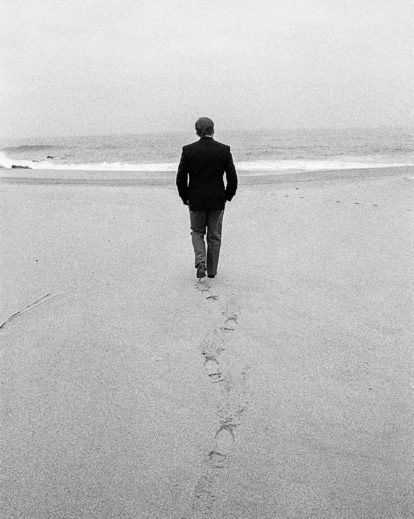No-one does elegance with a whiff of brimstone quite like Mark Gatiss. The writer and actor is a master of devilish disdain, the coded glance, the venom behind the polite smile. He arrives at Avaunt’s offices in a perfectly tailored navy-blue suit – the look could be that of a high-ranking civil servant, or Mephistopheles on a day out. Surveying his surroundings, he quips acerbically, ‘I’ve never penetrated Duncan Terrace before’.
What might his most famous co-creation, Sherlock, make of him at first glance? Would even he guess at the gothic imagination lurking behind the distinguished forehead? At the mind that produced urine-drinking toad-breeders in The League of Gentlemen; necromancy and baby-stealing in Crooked House; Dickens battling with zombies in Dr Who: The Unquiet Dead. At the brain that could conjure up Sherlock’s own nemesis, Moriarty, as a Bee Gees fan who leaves suicide belts as a calling card?
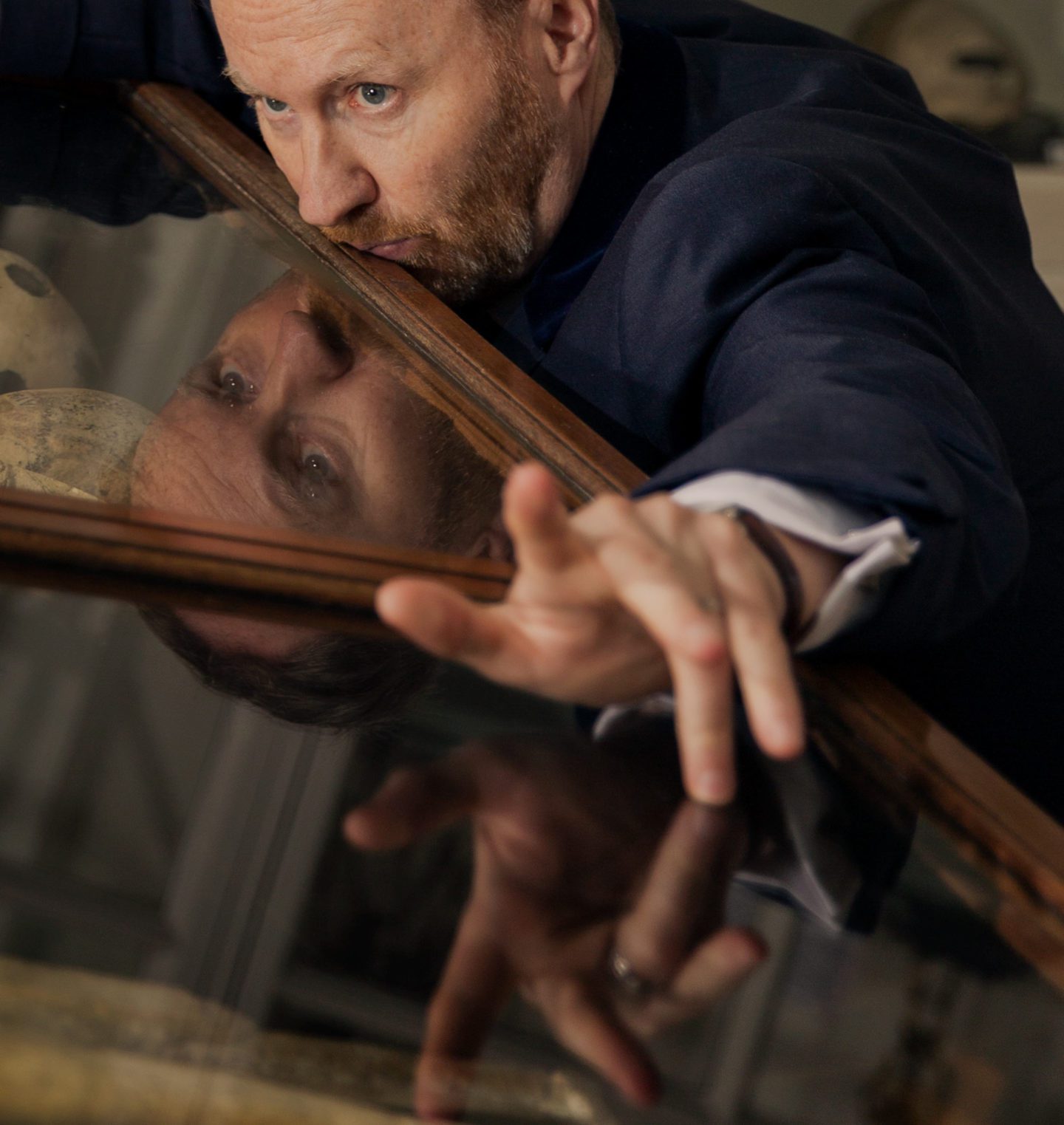
Mark Gatiss shot by David Vintiner at Barts Pathology Museum in London on 1 October 2019.
Where we all embody contradictions to a degree, Gatiss takes it up a notch. The man who is one of Britain’s most prolific and provocative TV writers manages to be simultaneously esoteric and mainstream, archaic and ultra-modern, demure and anarchic. His update of Sherlock stampeded into the twenty-first century with storylines involving genetic experimentation, security system breaches, and slick mobile phone gags. Yet his fetish for the past includes a fantasy of owning a full-size replica of HG Wells’ Time Machine. Specifically, Gatiss explains, the one from the 1960 movie, a shamelessly dated contraption complete with brass chassis resembling a sledge, giant ornate disc, comfortable velvet seat, and decorated revolving cylinder. ‘The film is a popcorn version of the book,’ he concedes with a smile, ‘but that moment when the Time Machine takes off is brilliantly realised, with the sun and moon racing across the sky’.
It is partly because of his obsession with HG Wells that he has come to talk to Avaunt today. As a boy Gatiss loved messing around with test-tubes, watching B-movies, and reading the kind of books that both entertained and stimulated his appetite for the extraordinary and the macabre. Wells was one of the writers who loomed largest; ‘At school I read War of the Worlds, The Time Machine, Food of the Gods, and a lot of his short stories in very rapid succession’. In a year that has been filled with tributes to the Apollo 11 Moon Landing, it’s worth remembering that Gatiss himself paid his own very distinctive tribute by including news footage of the landing in his 2010 adaptation of HG Wells’ The First Men In The Moon for BBC 4. The delicious twist was to argue that it was in fact his character, Professor Cavor, who had been to the moon first, hurtling heavenwards in full steampunk glory in a cast-iron sphere after discovering a material that could counteract gravity.
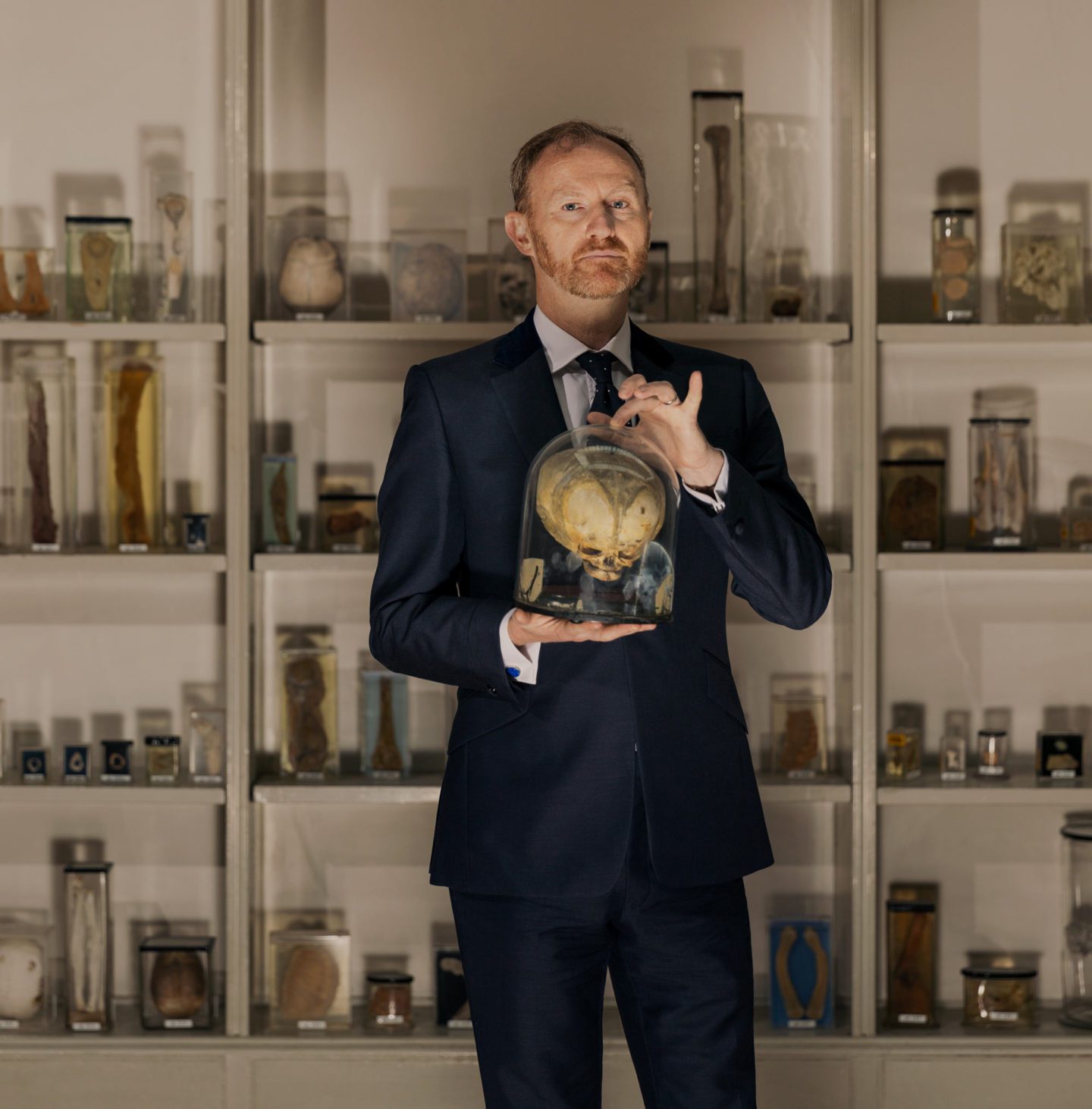
‘People talk about what it must have been like to have been born when the Wright Brothers took flight and died after we landed on the moon. But it’s equally incredible to have been born when we landed on the moon and to be alive during the information revolution.’ Photography: David Vintiner.
Gatiss and his long-term writing partner-in-crime, Steven Moffat, are all over the media right now because of their adaptation of Dracula for the BBC, written by one of Wells’ contemporaries, Bram Stoker. But the writer – who when accused of being a Renaissance man will frequently reply ‘So was Cesare Borgia’ – is more than happy to extend his brief beyond vampires. Since imagination is his preferred mode of travel, we start by talking about how it has often led the way for scientific advance, not least through Wells’ works. ‘Someone said he could see round corners,’ Gatiss declares. ‘There was something giddying about his writing. You’re thinking that was the first time anybody did an alien invasion, or a time machine, or a [scientific] invisible man. One thing after another. Bloody hell – he literally wrote the book.’
The Wells predictions that have come true include laser and atomic weapons, televisions and audio-books, a smartphone-like device, and travelators. In a nice circular flourish, he contributed directly to the Apollo 11 Moon landing, since War of the Worlds went on to inspire Robert H Goddard to invent both the liquid fuelled rocket and the multistage rocket.
‘A visionary like Wells can link things together in a way that other people can’t.’
Mark Gatiss
‘A visionary like Wells can link things together in a way that other people can’t,’ Gatiss says, ‘he won’t just cast the line and say “I can see to there,” he’ll always add “maybe I can go a step further.”’ What marks such writers and thinkers out, he continues, is that they never lose sight of the fact that however revolutionary the technologies of today might seem, the future will always eclipse them. ‘People often talk about what it must have been like to be someone who had been born when the Wright Brothers first took flight and died after we landed on the moon. But I think it’s equally incredible to have been born when we landed on the moon and to be alive during the information revolution. This is as big as the Industrial Revolution. There’s no question because it is changing everything about how we interact with each other around the world.’
What’s similar between now and the Victorian fin-de-siècle is the feeling that technologically things are developing so fast, it’s difficult to know what stretches credibility the most: science or the imagination. (The same could be argued of politics, but more of that later). If that’s the case, it makes sense that if you are truly engaged in writing about the modern world, science is as important for the imagination as imagination is for science. It wasn’t just Wells but Conan Doyle and Stoker who emphasised the importance of scientific awareness: the entirety of Dracula is structured through empirically rigorous reports, while Sherlock Holmes was famously the inspiration for forensic science.

Photography: David Vintiner.
Since all three have proved so seminal for Gatiss, it’s not altogether surprising that he once had a nineteenth-century-style laboratory in the Stoke Newington house where he first lived with his husband, the actor Ian Hallard. ‘What I wanted was a Frankenstein-style laboratory,’ he says. ‘We never created life there or anything, I just wanted it for the paraphernalia: I painted it blood red, I got some beautiful Victorian gas lamps for above the fireplace and restored the fireplace. What I really wanted was a Wimshurst machine [a nineteenth century electrostatic generator]: it has two discs rotating in opposite directions, and when you turn the handle it emits sparks and makes a cracking sound.’
The laboratory doesn’t exist any longer, ‘I realised it was a folly,’ though there are still bits of equipment lying around the house where Gatiss and Hallard now live. ‘I think it’s better to live with stuff you like than have it in some kind of shrine.’ We talk more about the similarities between Wells and Stoker, not least the startling fact that though they are very different books, Dracula and Wells’ The War of the Worlds were written in the same year. He concurs this is ‘extraordinary – it makes me think of that dinner at the Langham Hotel where The Picture of Dorian Gray and The Sign of Four were commissioned by the same person. What an evening. Wilde and Doyle at the same table. It sounds like a play in itself.’
One of the most curious similarities between War of the Worlds and Dracula is that the central figures in both novels prey on their victims by taking their blood. It’s a startling overlap – though the Martians, it should be noted, perform the operation somewhat less efficiently than Dracula, taking the blood from their victims with pipettes.
‘The idea that something can literally drain the life from you must strike very deep,’ Gatiss declares. ‘Stoker’s genius is to make it sexy. It’s a seduction. I suppose the Martians do it slightly differently.’ He laughs. ‘But it’s about losing your essence. I think the modern version of that is losing your identity. Some of the most familiar parts of Dracula persist in Invasion of the Body Snatchers. That’s the same story really in that it’s also about loss of identity.’
‘There was a man with one eye and an empty socket, and he put his thumb in his socket and just rocked back and forward. I was shit scared.’
Mark Gatiss
Gatiss’s ability to identify how themes from more than a century ago can strike sparks with a twenty-first century audience is key to his huge storytelling talent. Being able to tell stories as compellingly as he does brings with it a certain kind of power: it’s another interesting way in which imagination can cross-fertilise with reality. At its most basic level this is about fame and stratospheric ratings, but if you can command the attention of millions, then inevitably this ability takes on a political edge. I tease Gatiss – an ardent Remainer – by asking if he thinks that Dominic Cummings would have risen so high if Benedict Cumberbatch hadn’t played him in Brexit: The Uncivil War, prompting us to see him as some Sherlock-style maverick.
When I ask if he feels in some sense responsible, he laughs. ‘I think I’m going to have to have a word with Benedict about some of his choices. I have a feeling that if Barry Chuckle had played Dominic Cummings we wouldn’t be in this mess. There’s something in people’s associating Benedict with genius, and then transferring that association – especially to a previously backroom person like Cummings. If [playwright and screenwriter] James Graham does a sequel he should definitely be played by Barry Chuckle.’
More seriously he continues, ‘Normally I’m a cock-eyed optimist, but at the moment I’m at the end of my tether. I’m furious about the weaponisation of nostalgia – of the references by people like Farage to things like the Battle of Britain and the World Cup’. This, of course, is an example of the imagination – in the form of heavily manipulated narratives – trumping reality, with profoundly destructive consequences. ‘Johnson is just day after day chipping at what we perceive to be true,’ he fulminates. ‘They’re all following the Steve Bannon playbook – or Putin’s – of how to distract, so you never know. What I want to do now is a thing about Orwell called “I told you so”.’
When I press him on this, he says he hasn’t started, ‘It’s too depressing’. Gatiss himself is clearly fascinated by the machinations of power, but his taste is more inclined towards Machiavelli than mendacity. He was a superb Peter Mandelson in Channel 4’s Coalition (2015) (he has explicitly acknowledged him as the inspiration for Sherlock’s brother Mycroft). More recently he played George III in Nottingham Playhouse’s production of The Madness of King George III. One critic summed up the scenes he played (with Adrian Scarborough as the doctor) as‘electric’, while Dominic Cavendish of the Telegraph described him as a ‘bald eagle taking magnificent wing’.
He ascribes the success of the latter performance to his upbringing opposite Winterton Psychiatric Hospital, north of Sedgefield in County Durham, where his father was chief engineer. Gatiss devotees will be familiar with the fact that he saw the hospital as an extension of home life, ‘It had its own swimming pool. We used to get our hair cut there. We used to go to the cinema there. Chitty Chitty Bang Bang was the first film I ever saw. I remember Zulu. And I strongly remember The Enforcer with Clint Eastwood.’ It never occurred to him at the time that his upbringing was unusual, apart, perhaps from one occasion when he was asked to wait in a ward with his brother while their parents finished work, ‘There was a man with one eye and an empty socket, and he put his thumb in his socket and just rocked back and forward. I was shit scared.’
Journalists have often connected his upbringing with the more lurid visions conjured up in The League of Gentlemen. ‘I always think people bang on about the hospital too much,’ he says. ‘But when I did The Madness of George III for a year my upbringing became genuinely useful. No-one knows exactly what was wrong with George III. His symptoms were so weird it was diagnosed as porphyria. But they actually weren’t sure at all. I think it was a massive nervous breakdown. So I put in a lot of what I had observed growing up.’
In terms of the strange patterns our lives can trace it is, nonetheless, possible, to argue that there is a strong link between his being cast in The Madness of George III and The League of Gentlemen. When Gatiss and his co-writers for The League of Gentlemen – Jeremy Dyson, Steve Pemberton, Reece Shearsmith – were studying at Bretton Hall College in West Yorkshire, the distinctive brand of northern gothic they created was partly inspired by Alan Bennett (writer of The Madness of George III). Gatiss told another journalist, ‘All the things we loved ranged from proper horror to the horror of embarrassment: Alan Bennett, Victoria Wood, Mike Leigh.’ So it was extraordinary for them to realise that Bennett himself was a fan of the League. ‘It’s how I came to meet Alan.’
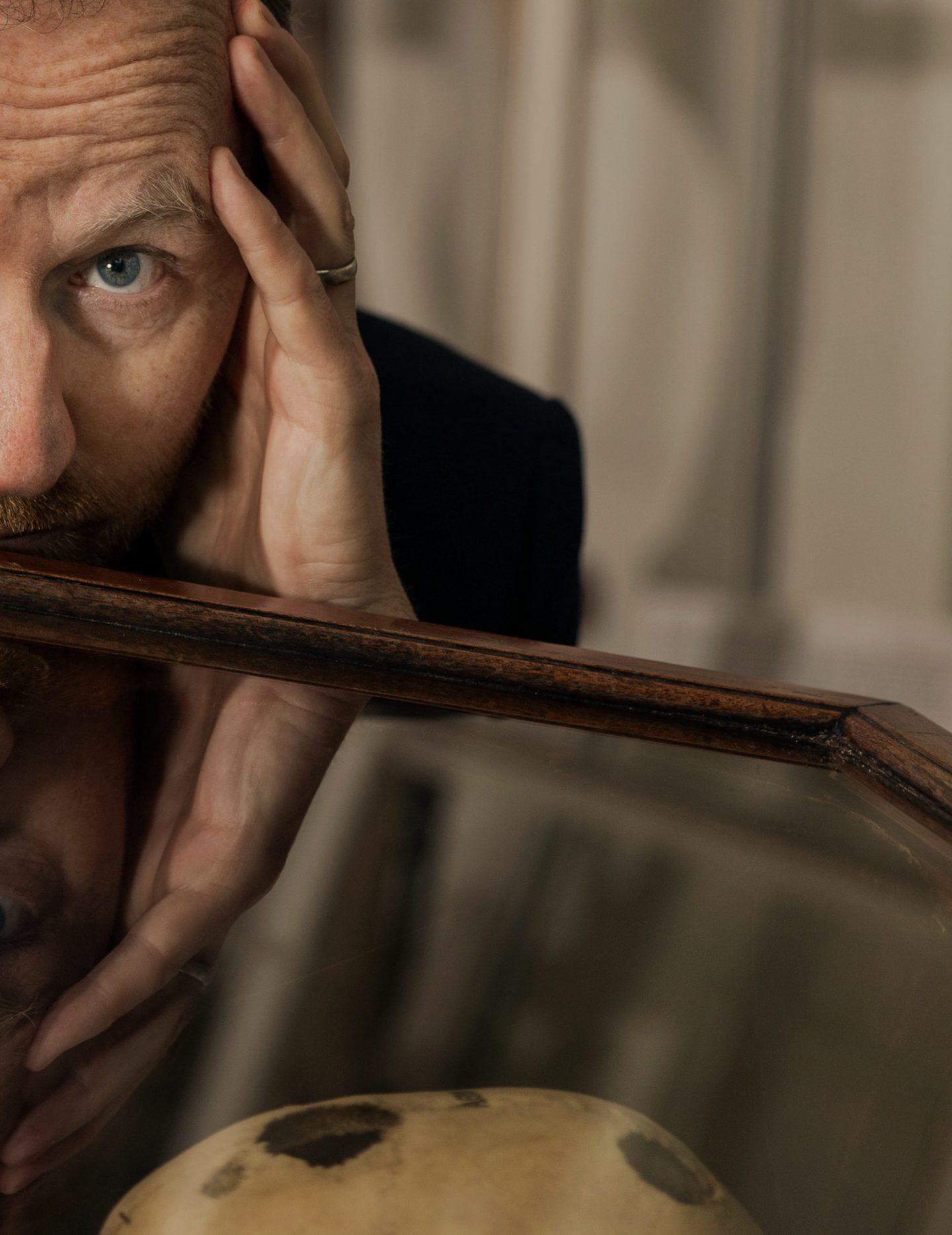
‘There’s something in people’s associating Benedict [Cumberbatch] with genius, and then transferring that association – especially to a previously backroom person like Dominic Cummings.’ Photography: David Vintiner.
A reunion for a The League of Gentlemen tour in 2018 somewhat surprisingly showed that, in a very different way from HG Wells, their writing had proved prophetic. Journalists observed that the warped insularity of Royston Vasey, epitomised by the freakish local shop with its murderous suspicion of outsiders felt like a forewarning of the mentality that would lead to Brexit. At the time he said ‘It’s a bit like a premonition… We were never satirical, but we found it irresistible and deliberately got [the character] Edward to say: “It’s time we took back control”.’ During the tour he observed, ‘Some places are rust-belt Britain… I thought constantly of Disraeli and two nations. [“Two nations between whom there is no intercourse and no sympathy.”] It made me think that some people must look at events in Westminster as if they’re taking place on the moon. That’s why, when they were finally given the chance, they kicked back. And that’s why we’re in this fucking mess.’
It’s a fascinating example of how writing can sometimes see round corners without even the writers themselves realising the extent of its vision. As someone who has been repeatedly proved to have his finger on the nation’s pulse, what has Gatiss concluded is the secret to compelling TV that speaks to the audiences of today, and indeed tomorrow?
‘When we were modernising Sherlock Holmes,’ he replies, ‘some of it was very straightforward and fun. He wouldn’t smoke a pipe. So we thought what if he had three nicotine patches? Other things were tougher because we were asking ourselves how, after the creation of forensics, he still seems exceptional in this world. The big breakthrough for us was that he’s still the person who makes the intuitive leap. So in the first episode [A Study in Pink based on Conan Doyle’s A Study in Scarlet] they find the corpse. And Sherlock asks “Where’s the suitcase? Well there must be a suitcase.” A pink suitcase it turns out. And no one else has thought of that. He’s seen round the corner. And no-one else is catching up, so he’s very frustrated.’
Gatiss’s work is marked by its fast-moving, pared-to-the-bone scripts. His favourite authors were writing during the time that theatre was the dominant form of entertainment: does he feel that TV has introduced a different tempo and style to narrative? ‘Storytelling has obviously changed,’ he asserts. ‘Though you can’t just keep accelerating so that it’s like some flick book. But I’m always impatient. When you know a script’s lagging – you just need to take the air out between those lines. We all just learn constantly. You read famous screenplays and you work out why they’re clever. I always aspire to keeping the writing as lean and compact as possible. Sometimes you have two scenes and a third party will go, “You don’t need those. You could literally sum that up in a line”. And you say, “oh my God you’re right”. When you crack it it’s so exciting. You should always try to find a way of ditching complicated information or exposition and just work out a neat way into it.’
‘Having said that,’ he continues, ‘I don’t like things to be all crash bang wallop and very in your face. I also believe in letting things take their time. All my favourite things are ghost stories. I’ve just made a new one – MR James – I was going through the music earlier today, and I was stripping it out because the silence is an incredibly important part of the story’s architecture. When sound drops out it can do something to the back of your neck. It’s spooky, but it’s also just about letting the whole thing find its time.’
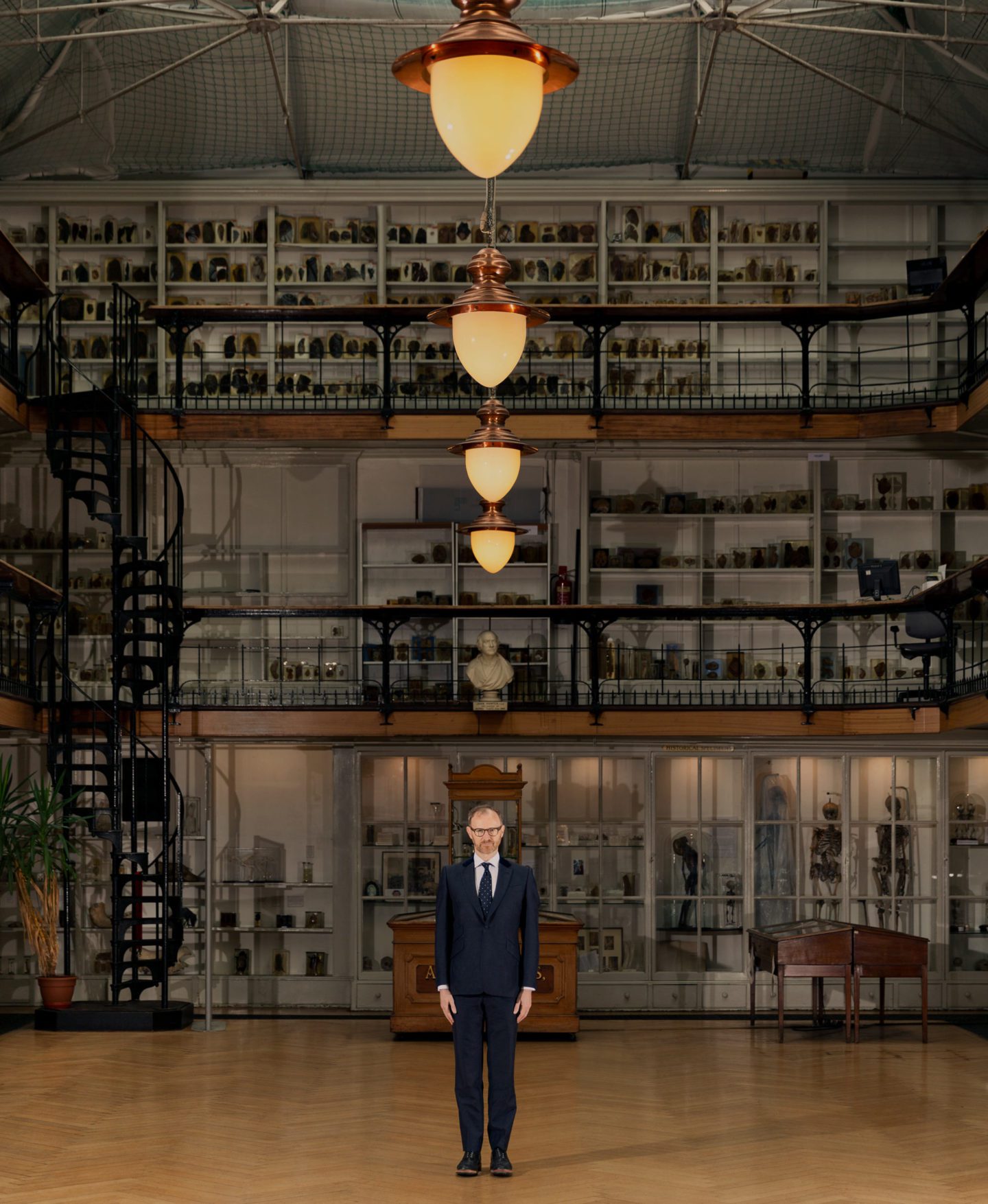
Photography: David Vintiner.
Ghost stories bring us to the biggest and most unavoidable reality of all – death. Gatiss has often talked about his fascination with death, ‘but I’m much less interested the older I get. I’m much more interested in life. You are, aren’t you, when you get older. There’s a lovely line in The Moving Toyshop by Edmund Crispin. They’re sitting in a boat trying to trap the murderer and it’s a crepuscular evening, and he says, “The significance of death closed around him for a moment like the petals of a dark flower”. I thought, oh, I know that feeling, that 3am feeling. But then you feel all right because you wake up the next morning and everything’s all right. I still I suppose fear it in many ways but I’m better at not fearing it’.
Has that changed because of the deaths in his family? He lost both his mother and sister to cancer in the same year. ‘I’m afraid so. The more experience you have, the more you get used to it. The Victorians had a much more healthy attitude towards death. We talk about post-traumatic stress. But so many parents then had to deal with losing their children. A Christmas Carol’s one of my all-time favourite books – what’s under-explored in that is the brilliant evocation of grief for the Cratchetts. When Bob comes back from the plot of land dug for Tiny Tim and starts talking about it, at first he says “No, I’m all right,” and then he goes “Oh, my little little child”. It cuts through me.’ As Gatiss relates this, the pain in the word ‘cuts’ is audible. He is close to tears. Wiping an eye, he declares ‘It destroys me’.
The interview is coming to an end, and it’s time for us to get a cab down to Barts Pathological Museum for the photoshoot. Barts Hospital of course is where Sherlock performs his experiments, both in the original Doyle stories and the TV update: it’s also where his faked suicide takes place in the TV series. ‘Look,’ says Gatiss as we get out of the cab. He is pointing up to the roof of a part of Barts that is currently covered in scaffolding. ‘That’s where Sherlock leaped from. There used to be a phone-box here filled with messages from fans saying they hoped he was all right.’
He is now back in acerbic wit mode. Another aspect of his success as a storyteller is that cultural figures who he looked up to as a boy and a young man now seek his company out. ‘I had lunch with George Lazenby [who played Bond in On Her Majesty’s Secret Service] the other day,’ he confides with some glee. ‘I took him out to lunch and it was amazing. He’s a very nice guy, very laconic, very Aussie still.’ He goes into character. ‘“I’m just a lucky bastard Mark.”’
What next for Gatiss? ‘I love detective stories, and I love the Golden Age detectives. I’d like to do something set in the Thirties or Forties. I find the paraphernalia of it very attractive. A couple of years ago I got lost in a rabbit hole trying to find classic Golden Age novels with the silliest titles – then I ordered my favourites. They included, He Should Not Have Slipped, (he starts to laugh), Death in Hospital, Vegetable Marrow – which is actually very good. But the one that made me cry with laughter, because you expect a book to be called, you know, Death on the Nile, was They Rang Up The Police.’ His eyes widen. ‘What an amazing mundane title. It’s in fact rather a clever book. You can imagine them saying “What shall we call it? Call the Copper? No. We need something more dynamic. Let’s call it They Rang Up the Police.”’
It’s clear, at the end of the day, that whatever we’ve concluded about the relationship between imagination and reality, what’s most important for Gatiss is the way in which stories can help you to escape the real world. ‘There are certain things I know about myself when the pennies drop and all the chips are down. Ask me, “What is it you really like?” and it all goes back to Chitty Chitty Bang Bang and those early cinema experiences. What I want most is to recreate a feeling of an exciting Bank Holiday. That sense of anticipation. It’s like the Saturday night anticipation watching the football scores knowing Doctor Who is coming. It’s like just the thrill of the first time that a James Bond movie was shown at Christmas time. It does something at the back of my neck and I get a flutter of happiness.’





